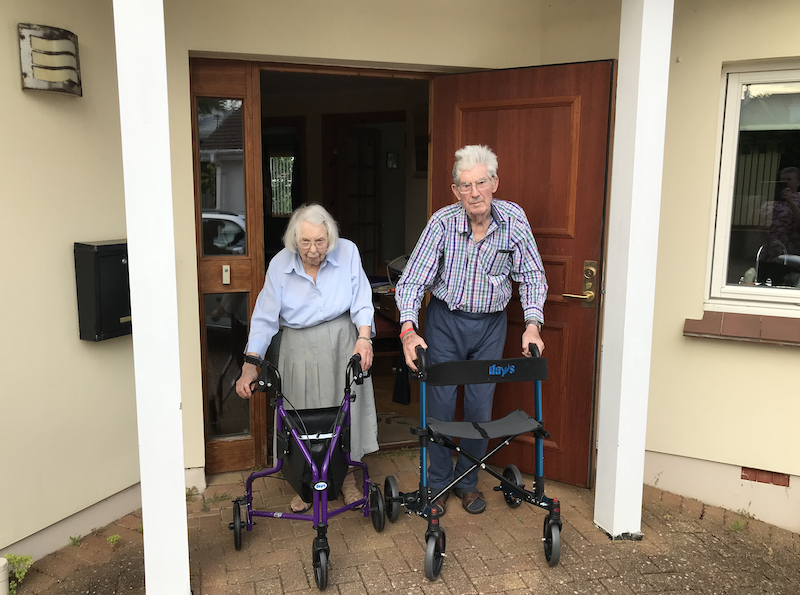


The States is being urged to invest in ‘care in the community’ by a man whose father has been on the Carey Ward for three months waiting for the care package he needs to return home.
Paul Watts’ father - Geoffrey Watts - was admitted to hospital this year with health complications, and has since been told that he's ready to go home with a limited 'care in the community package', with morning and night visits by a carer.
This was around three months ago, and Paul says the wait is forcing his family to make some tough decisions.
“We’re waiting on a care package from HSC, but this is either week eleven or week twelve now, I’ve lost count,” he said.
“This is not an environment conducive to living – there is a constant noise of equipment and alarms. [My parents] are coming to the decision that they will need to go into a care home if they are able to live together.”

Pictured: Geoffrey Watts and his wife Shirley want to be able to live together.
Mr Watts understands that there’s a shortage of staff to support everyone who needs care at home, but argues there should be more of an emphasis on this, instead of viewing care homes as the first response.
“Going into care will have a considerable financial impact upon them and the States,” said Paul.
“Dad will hopefully receive a long-term care allowance, but mum’s bed will have to be fully self-funded at £39.5k per year.
“They’ll also need to fund the co-payment element for dad’s bed by another £12.5k, so looking to fund £52k per year.
“This will ultimately require them to sell their home,” he commiserated.

Pictured: The Carey Ward at the PEH is usually utilised for 'Acute Medical Care.'
Mr Watt’s family will be required to draw on the long-term care benefit, the threshold of which his father has crossed, but his mother hasn’t, despite her living with dementia.
The Committee for Employment and Social Security will then fund £27k of the annual cost of a residential bed.
Mr Watts argues that this money would be better spent in the community, hiring more carers and progressing the ‘caring in the community’ ethos.
“There’s a lot of evidence out there now for the benefits of care in the community, which is why Deputy [Heidi] Soulsby (ex-President of the committee for Health and Social Care) was planning to go down that line,” he said.
“I estimate that buying in care to meet dad’s needs would be in the region of £17k a year, a direct payment system would therefore create a 37% saving compared to the long-term-care funding.”
The benefits of keeping people in their own homes under professional and familial care has been support by Carers Guernsey since the group's inception. The local charity provides practical and emotional support to carers.
“It’s a big commitment to care for somebody at home and some carers do feel under pressure to take on that role,” said Service Manager, Alysa Martel.
“We’ve seen this problem coming over the horizon for the past few years with our ageing population, care homes are closing down if anything – there’s a lack of beds, there’s a lack of resource.
“We’d like to see an increase in the carers allowance, we’d also support anything that can be done to take the pressure off the service and provide more resources to carers,” she said.

Pictured: Some people's care needs can be met without needing to give up their independence.
Mr Watts said supporting carers at home is a win-win scenario for families and the States.
“Living at home has been proven to have better outcomes than living in care, it is what my parents want, and it will save the States money.
“The costs related to supporting one person in a care home would provide benefits to more than one person when spent on care in the community,” he concluded.
The States of Guernsey said it cannot discuss individual cases, but said that the community care sector is "facing a challenging period where demand is outstripping staff resources."
"Dr [Peter] Rabey [the States' Medical Director] referenced the impact of these current challenges during the press briefing on Friday," said an HSC spokesperson.
"Our teams are doing all they can to examine how we can increase capacity. We understand the frustration of service users and their families during this unprecedented time of demand."
Comments
Comments on this story express the views of the commentator only, not Bailiwick Publishing. We are unable to guarantee the accuracy of any of those comments.